#nass el ghiwane
Text

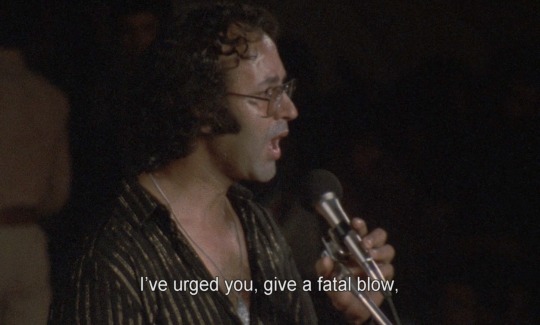

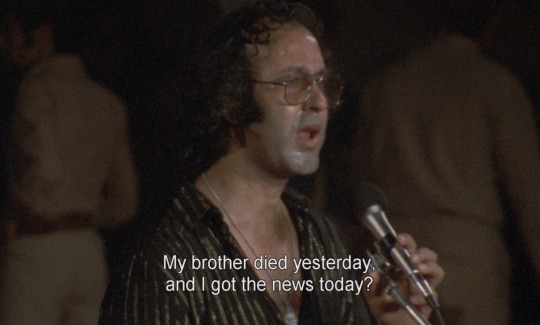

الحال // TRANCES (1981) dir. AHMED EL MAANOUNI
20 notes
·
View notes
Text
59: Nass El Ghiwane // Nass El Ghiwane

Nass El Ghiwane
Nass El Ghiwane
1976, Plein Soleil
The job of a label press release is to pique interest in a record, and when you’re in the ~*world music*~ reissue business that usually means trying to find a parallel between your artist and a familiar touchstone, angling for the off chance an openminded shopper will take a shot and throw your record into the day’s stack. This is the ship that launched a thousand “the [western artist] of [non-western country]” blurbs (“The Hendrix of Turkey!” “The Joni Mitchell of Zambia!” “The Mort Garson of Brunei!” etc.). It worked on me when a somewhat younger, much callower version of myself snagged Nass El Ghiwane (1976) from a shop that’d taped an excerpt of the press release to the sleeve. Here it is in full:
“Formed in 1971, Nass El Ghiwane's five members first performed in the avant-garde of Morocco's underground theater scene. Following their debut performance as a band in Rabat at Tayeb Seddiki's Mohammed V Theatre, their songs became the 1970s anthems of Moroccan youth -- nationalist, rebellious, experimental, and bygone all at once. They are Morocco's most enduring musical legacy. They modernized the way music was transmitted to the disenchanted and rebellious youth of their country. Their concerts would turn into riots as their music and lyrics incited deep affection from their virulent fan base. Their music echoes medieval Moroccan oral traditions; coming from the Gnawa trance music of their ancestors, they sang tales of Sufi mystics and wrote lyrics that criticized the conservative monarchy of Mohammed V. They were the first to introduce the banjo, guembri, and colloquial Moroccan Arabic in their version of the shaabi genre. Nass El Ghiwane were a huge influence on Algeria's modern Raï movement, as Cheb Khaled started his career covering Nass El Ghiwane's songs. This is exemplary trance music and the foundation of the modern era in Moroccan music. Martin Scorsese has called them "‘The Rolling Stones of Morocco.’" It could be argued that Scorsese's claim would be more accurate if the Stones were fronted by Bob Dylan. This is the first ever vinyl reissue of their third album from 1976, one of the most desired LPs in their legendary discography. Fully remastered sound.”
It's a near platonic ideal of its kind—rife with dope-sounding references (Gnawa trance music! Sufi mystics! Concerts breaking out into riots!), and intriguing bold-type names.* I might have had no idea who Cheb Khaled was, but the wording insinuated I should and would like to, and the references to the Stones and Dylan suggested I was holding some kind of wicked fusion of Arabic folk music and heavy rock. Which anyone who knows anything about Gnawa trance music, or shaabi, or Raï, probably could’ve told me it wasn’t, but none of those people were in Sonic Boom Records at that time, so they didn’t, and I ended up with a record I really didn’t know what to make of for quite a while.
To paraphrase writer Ralph Wiley’s rejoinder to Saul Bellow’s (allegedly) dismissive question, “Who is the Tolstoy of the Zulus?”, the Rolling Stones are the Rolling Stones of Morocco, and Dylan is the Dylan of Morocco. Nass El Ghiwane are similar to these acts in the sense that they were famous and countercultural in their own society, but what that meant in a Moroccan context, and in musical terms, is very different. “Nass El Ghiwane isn’t a pop group in the classical sense, but more of a theatre group that sings,” noted Tayeb Seddiki, a theater director who helped launch their career. He continues:
“They’re sort of troubadours. In the Atlas Mountains, we have three or four poets who travel from souk to souk, from village to village, singing stories from a political, economic or sociological viewpoint that deeply interests people. […] Nass El Ghiwane were the first, and they still are. Moroccans recognize themselves in the group. They see their problems reflected in their songs, their daily lives and all their issues.”
This is something close to a working definition of the appeal of any ethnic or national folk music, music that seems to concentrate the experience of living within one’s culture into song. Like many American and British folk revival artists of the ‘50s and ‘60s, Nass El Ghiwane began by performing and reinterpreting traditional songs. In their case, this was romantic poetry that had been preserved through oral traditions going back generations. Once thoroughly steeped in the scales and structures of these familiar songs, they began to also create original material that felt to Moroccans like an organic outgrowth of their proud musical lineage.
youtube
Though I eventually grew to appreciate the insistent rhythms and passionate group vocals of the LP I’d purchased, it wasn’t until I watched the 1981 documentary/concert film Trances (الحال) by director Ahmed El Maânouni that I got a better handle on what made Nass El Ghiwane such a profound experience to their fans. (I highly recommend this 88-minute film, which Criterion re-released in the 2000s. I was able to easily find a high quality rip on the Internet Archive, and this YouTube version is decent.) Nass El Ghiwane’s performances alternated between dramatic spoken word monologues and incantatory rave ups which left audiences in exhausted, cleansed heaps. The film makes explicit the connections between the ecstatic healing rituals of the Gnawa and the wild dancing of the band’s young fans:
Here, at last,
comes the time of ecstasy, of trances
Those who refuse to their senses
the gift of trances
shall wither
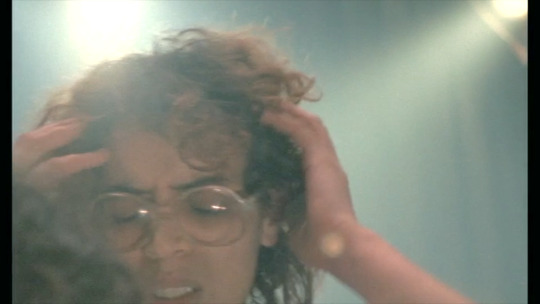
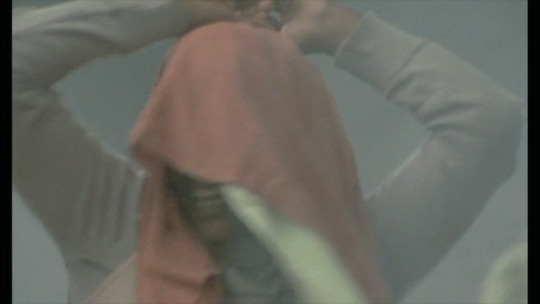

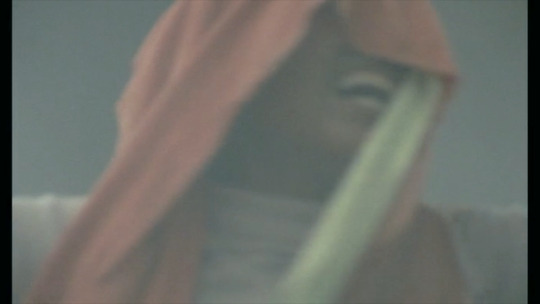
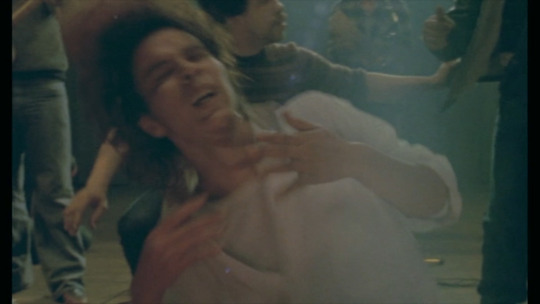
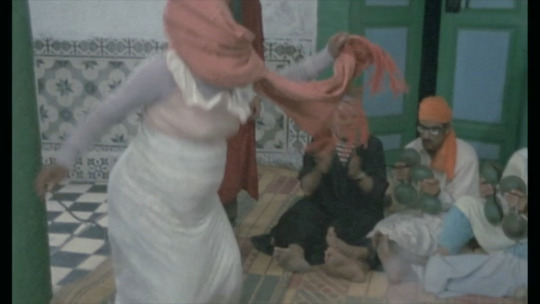

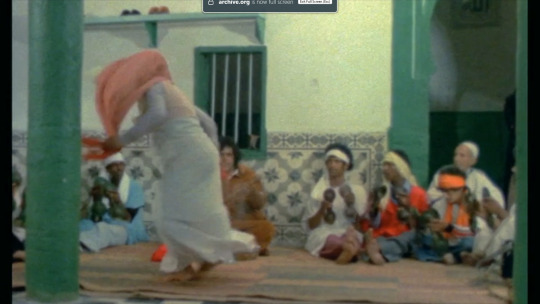
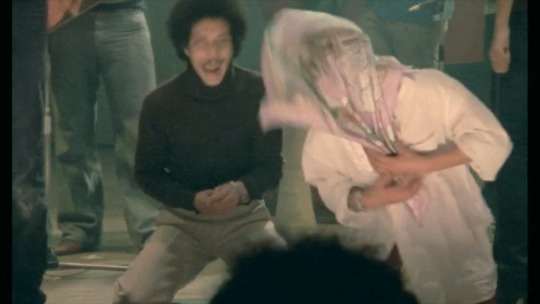

Trances also gives welcome insight into each member’s personality and role in the band. There is virtuosic banjo player Allal Yaâla, a quiet Black Moroccan with a mastery of Arabic, Berber, and occidental scales who taught the others much of their original repertoire. Tabla drummer and frequent lead singer Larbi Batma was their soul, a lanky, intense poet whose seriousness was offset by the sly humour of bendir (handheld frame drum) player Omar Sayed, the strongest actor of the troupe and perhaps its most gifted singer. The longest-running version of the band was rounded out by Abderrahmane "Paco" Kirouche on sintir (a sort of bass lute) and daadoua (a shoulder-held goblet drum), a robust man who’d been a woodcarver before finding musical success.
Nass El Ghiwane is an LP I appreciate more as I discover more of its context, knowing not only who these men are but how their talents fit together; some notion of where their music came from, and how audiences of their time received it. It benefits from being played as loudly as you’re comfortable with and being listened to in a meditative frame of mind. Nass El Ghiwane were “the Nass El Ghiwane of Morocco” just as they are the Nass El Ghiwane of Canada, Cambodia, and Fiji—but if a Scorsese quote comparing them to the Stones is what got me listening to them, I reckon that’s fair enough.
59/365
* Also, bless the Plein Soleil press release writers for bolding Mohammed V’s name, in case there were any real Alawi-dynasty heads out there in record-land. Worth noting they got the wrong king though, as it was actually Mohammed V’s son Hassan II who was in power during NEG’s heyday!
#nass el ghiwane#gnawa#trance#moroccan music#Ahmed El Maânouni#rai#music review#vinyl record#martin scorcese#'70s music#north africa
6 notes
·
View notes
Text
يكفاك د البكا يا عيني
يكفاك همد الحال
يكفاك د البكا يا عيني
يكفاك همد الحال
الضرف غشمني ولاحني
ما بقى لي أمال
الضرف غشمني ولاحني
ما بقى لي امال
لله يا لي تسألني
لا تطلب المحال
قصتي واضحة فجبيني
ما بقات رغبة تلهيني
عل الفراق عوال
عل الفراق عوال
0 notes
Text
TRANCES:
The Moroccan band
Connected with Arab youth
Using traditions
youtube
#trances#random richards#poem#haiku#poetry#haiku poem#haiku poetry#haiku form#poetic#documentary#haiku on tumblr#criterion collection#Nass-El Ghiwane#Larbi Batma#Abderrahman#Omar Sayed#Allal Yaala#Ahmed El Maanouni#Youtube
0 notes
Note
Tell me more about the North African music of protest, because that sounds like a class I would have loved (not speaking Arabic notwithstanding).
OKAY!!!!
So this class is about music and people of North Africa and it is probably the coolest class I've ever taken. It's cross listed in Folk Studies, Anthropology, and African American Studies bc it's a one off and the university couldn't decide where to put it ig??
So the first thing to understand is that defining North Africa is tricky. Generally accepted definitions include Morocco, Algeria, Tunisia, Libya, Western Sahara, and sometimes Egypt. This area of the world could conceivably fit in many different geographical areas: the Middle East (also tricky to define), the Arab World (different from the Middle East!!), Mediterranean countries, Africa. In Arabic there is a distinction between the Mashriq/مشرق and the Maghreb/مغرب, meaning the East (i.e. the Arabian Peninsula) and the West (i.e. North Africa) and Egypt sort of floats between the two depending on what political purpose the definitions are serving at that time. The Maghreb/North Africa is often called Jazirat al-Maghreb (the Island of the Maghreb) in Arabic because it is culturally and geographically distinct from the other Mediterranean states to the north, the Saharan and sub-Saharan African states to the south, and the Mashriq to the east.
So! To get into protest music! After North African states fought for and won independence from their European colonizers (notably the British in Egypt and the French in Tunisia, Algeria, and Morocco) they had to decide how to build a national identity, and they chose Andalusi music (music brought by Arab and Jewish migrants from the Iberian Peninsula after it was re-conquered by the Spanish) as a major part of this, and suppressed other genres of music, especially ones that were considered perverse or corruptive. This included Algerian raï and Tunisian mezwid, because they were music by and for the urban poor. Raï and mezwid discussed drinking, sex, drugs, and other taboo subjects, and were generally considered not appropriate for polite company. Raï in particular played with gender roles, with men sometimes singing in a high tessitura and women singing in a lower register. Despite the censorship both of these musics faced, they are arguably the most popular national music in Algeria and Tunisia respectively, and suffer less censorship now than they did in the 1980s and '90s.
Now I've gotten this far without discussing indigenous North Africans, but that's about to change. The Maghreb has been colonized by several different groups over thousands of years: the Romans, the Arabs, and the Ottomans. The people these groups were conquering are the Amazigh (also called the Berber people, but they mostly now self-identify as Amazigh/Imazighen (pl.) meaning freemen, so that's what I'm using). And the Amazigh are still around! For decades after the end of colonization it was forbidden to teach Tamazight, the Amazigh language, or to broadcast their music, but that is slowly changing, and there is a pan-national Amazigh movement to preserve their music, culture, and language! Additionally, there are significant Black populations in North Africa, many of whose ancestors were brought from sub-Saharan Africa to the Maghreb as slaves, or who immigrated to the Maghreb. These populations and their music (Gnawa and Stambeli, most notably) were also suppressed in favor of Arab and Andalusi music. Eventually, in the 1970s in Morocco, a band called Nass el Ghiwane formed, drawing on the different heritages of their members, who were from different parts of Morocco and included men with musical heritage in Gnawa and Amazigh music, to meld this with Arab music and Western rock influences. Nass el Ghiwane was hugely popular, and their music, which often involved spoken poetry or proverbs, was used to critique the state of Moroccan society in a time of intense censorship, and incorporated the sounds of marginalized groups in a new way.
This was probably more than you wanted, but I think it's so interesting! The links go to Spotify playlists/pages if you want to give it a listen!
23 notes
·
View notes
Text
🎧🎶🎶🎧
#soundcloud#اقتباسات#اقتباس#اقتبست لكم#اقتباسات تمبلر#تمبلريات#تمبلر عربي#أصدقاء تمبلر#اهل تمبلر#تمبرليات#آل تمبلر#تمبلر بالعربي#عائلة تمبلر
3 notes
·
View notes
Text
@primalfears tagged me in the url song challenge n so abt a week ago i spent a shift at work v distracted n doing it. And retooled today bc i wanted no English somgs but then i narrowed it down to only north african artists
A-Ana Machi Sahel -Saad Lamjarred
N- Nia - Oum
I- Imik Si Mik - Hindi Zahra
S- Saharagga - Gnawa Diffusion
S - Senya Oul Bir - Houcine Slaoui
A- Aini Ya Lalla - Nawel Ghachem
P- Palestine - Nass El Ghiwane
I- Imarhan - Imarhan
E- Esma Yalli - Hakim
R- Rham Ino Yamghar - Laila Chakir
C- C'est Chelou - Zaho
E- Ehe Awa Yehe - Bnat Oudaden
Heres the playlist
Tagging whoever wants to
#was going back n forth abt putting aicha on here but if ppl can put little richard n David bowie n others.... but this is just a postscript#saying that though i enjoy khaleds music him being a shitbag partner w drppped domestic violence charges is also true#but then i decided tht i didn't need him here#its not a most impactful artists playlist#might make another w a different theme#tag memes#Spotify
1 note
·
View note
Text
Replay "The Voice Kids" : Leïla chante "Siniya" de Nass El Ghiwan - Vidéo
http://dlvr.it/St40B5
0 notes
Text
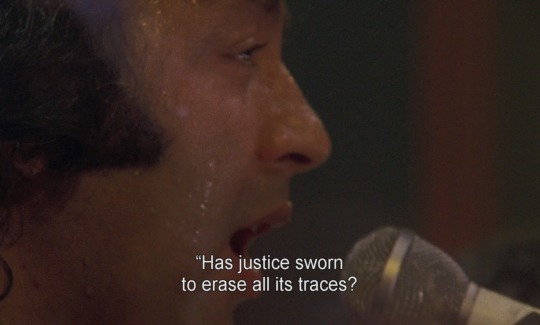

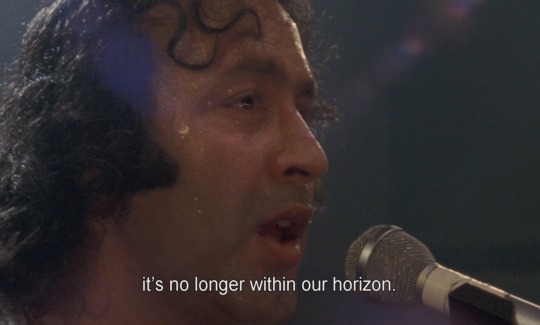
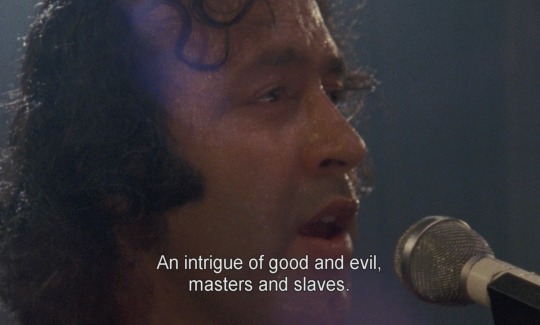
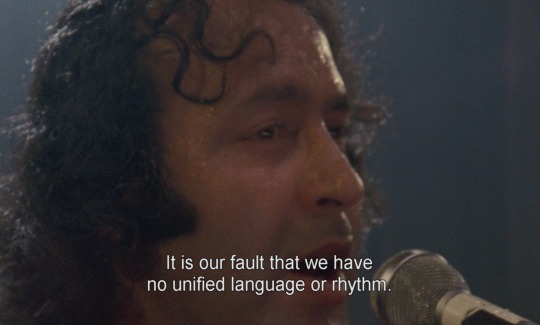
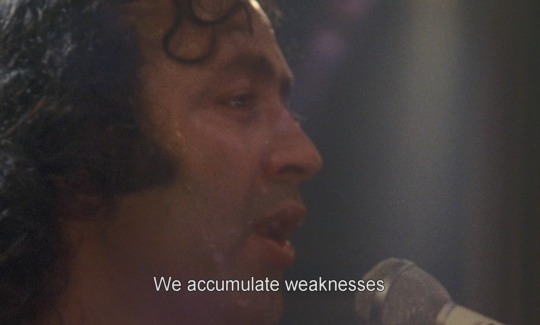

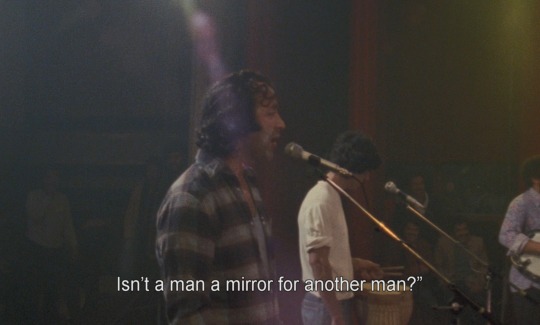
الحال // TRANCES (1981) dir. AHMED EL MAANOUNI
11 notes
·
View notes
Text
THE END
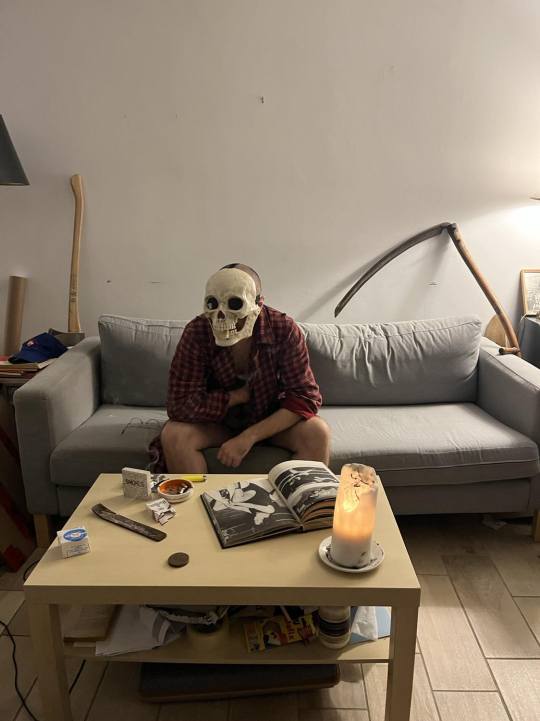
Stats
I'm a bit of a goon for stats and lists, so as I close the book on this project, here are a few highlights.
Total word count: 181,231
Average review length: 497 words
Longest review: 1,761 words (138: Various Artists // Experiments in Destiny)
Shortest review: 131 words (303: Alice Coltrane // Journey in Satchidananda)
Most reviewed decade: 1970s (110)
Firstest review: Various Artists // Keep on Truckin' (1)
Lastest review: Patti Smith // Horses (365)
Middlest review: [TIE] Sandy Denny & the Strawbs // All Our Own Work (177) & Various Artists // The Paths of Pain: The CAIFE Label, Quito, 1960–68 (178)
Age: 37
Wives left: 0

Twelve of my favourites
1: Various Artists // Keep on Truckin': How a series of TV commercials made Americans crazy for novelty truck driving songs.
32: The Who // Meaty Beaty Big & Bouncy: A free, online personality quiz.
59: Nass El Ghiwane // Nass El Ghiwane: Moroccan legends, quibbling about hype stickers, and the gift of trances.
90: Joe Coleman // Infernal Machine: Exploring a well-remunerated "Outsider artist" and his fixation on serial killers (feat. the craziest picture disc I've ever seen).
92: Aquariana // Aquariana: Your introduction to Father Yod and the Source Family cult, plus some weirdo piano ballads.
179: Elvis Presley // The Sun Collection: I asked 17 of my friends (and my grandma) for their opinions on Elvis.
199: Zero Kama // Zero Kama: In 1983, Austrian Psychic TV-devotee Zoe DeWitt snuck into a charnel house and scavenged a pile of human bones, which she then fashioned into musical instruments. This is the music that resulted.
209: Rob Hertner // Bucky's Heartaches: I research a private press country record by a Texan expat in London, and unearth his life as a crackpot political figure in Britain and connections to a terrorist militia group.
227: Jim Sullivan // U.F.O.: A guide to six lesser-known private press folkies, prepared with the assistance of antiquarian D. John Christie.
256: Maria Tănase // I: Romania's answer to Edith Piaf, and a figure much in need of rediscovery.
270: Purple Mountains // Purple Mountains: On David Berman's last work, and writing through pain.
319: Gilbert Bécaud // Incroyablement: A lovestruck fool, but no dummy. Some thoughts on an irrepressible chansonnier.

These are so stupid
Blogs tagged "this is so stupid"
7 notes
·
View notes
Text
Soubhanallah - Gaâda Diwane de Béchar
cover by Gaâda Diwane de Béchar in 2003
original by Nass El Ghiwane in 1976
#algeria#morocco#nass el ghiwane#سبحــان الله#ناس الغيوان#gaada diwane de béchar#70s music#music#algerian music#moroccan music#00s music#2000s music#i love this song so much
4 notes
·
View notes
Text
youtube
1 note
·
View note
Video
youtube
when I put my hands on my dad’s original cassettes of these recordings, it’s over for you hoes
1 note
·
View note
Audio
16 notes
·
View notes
Photo
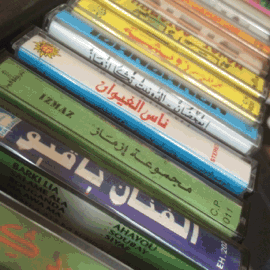
Settle in for an hour of music from Morocco. We've got Gnawa music from Mahmoud Gania, classics from Nass El Ghiwane and Izenzaren, and tranquil folk sounds from Archach and Inrzaf. https://www.totallyradio.com/shows/the-junk-shop/episodes/the-junk-shop-24-oct-2016
0 notes